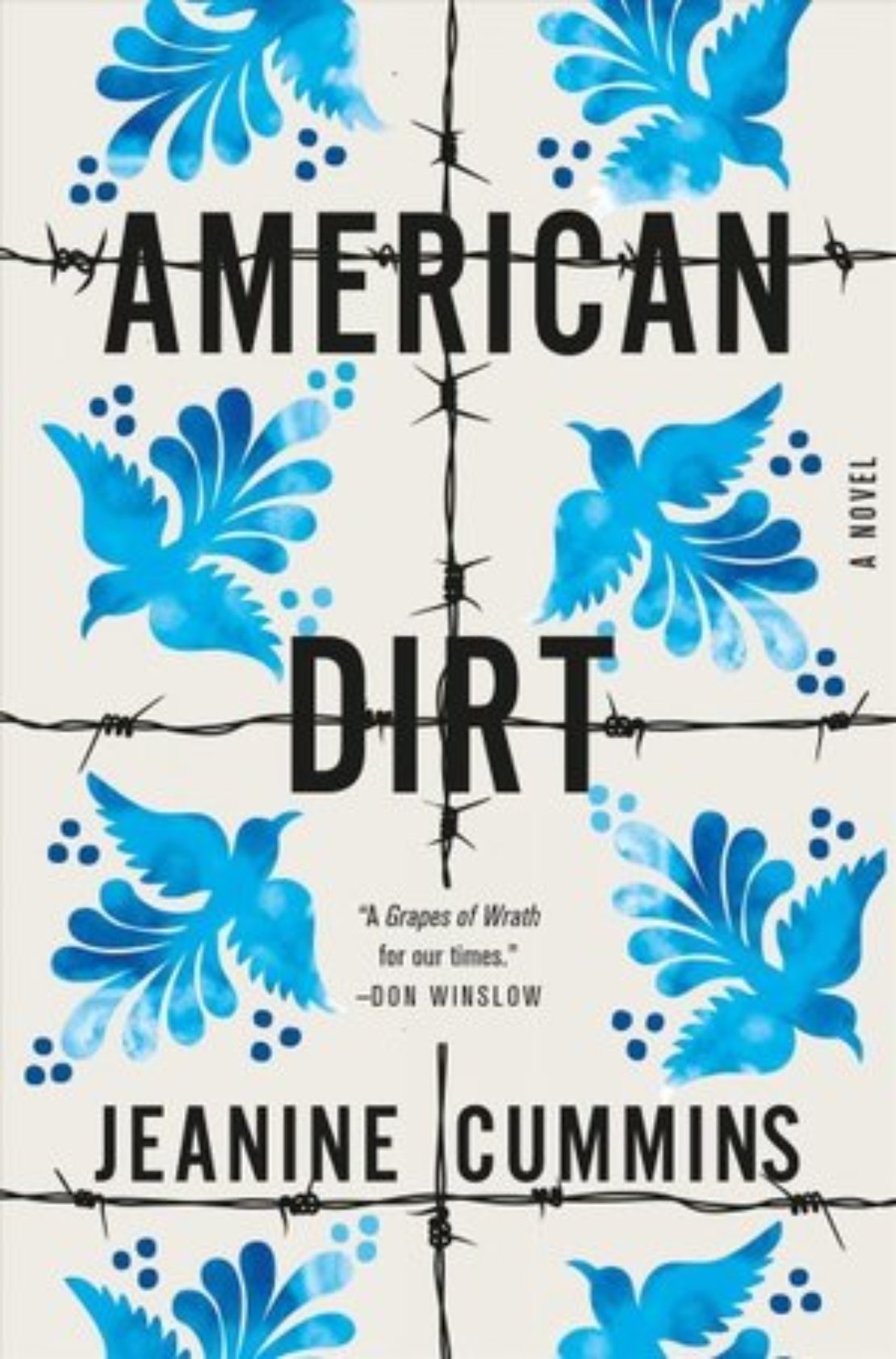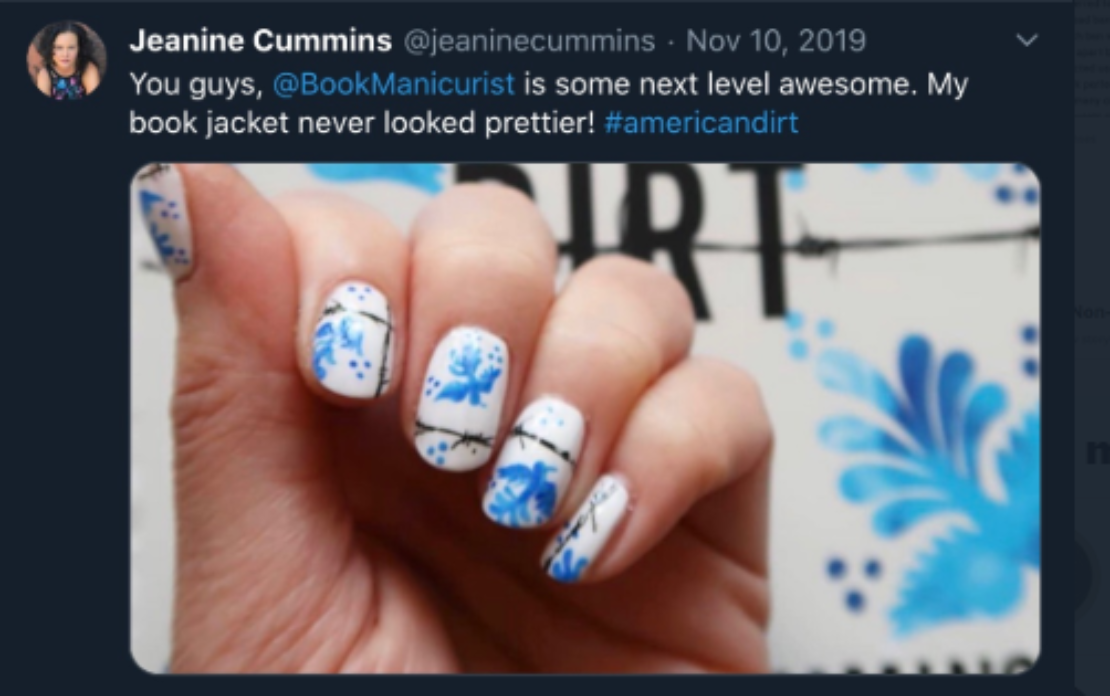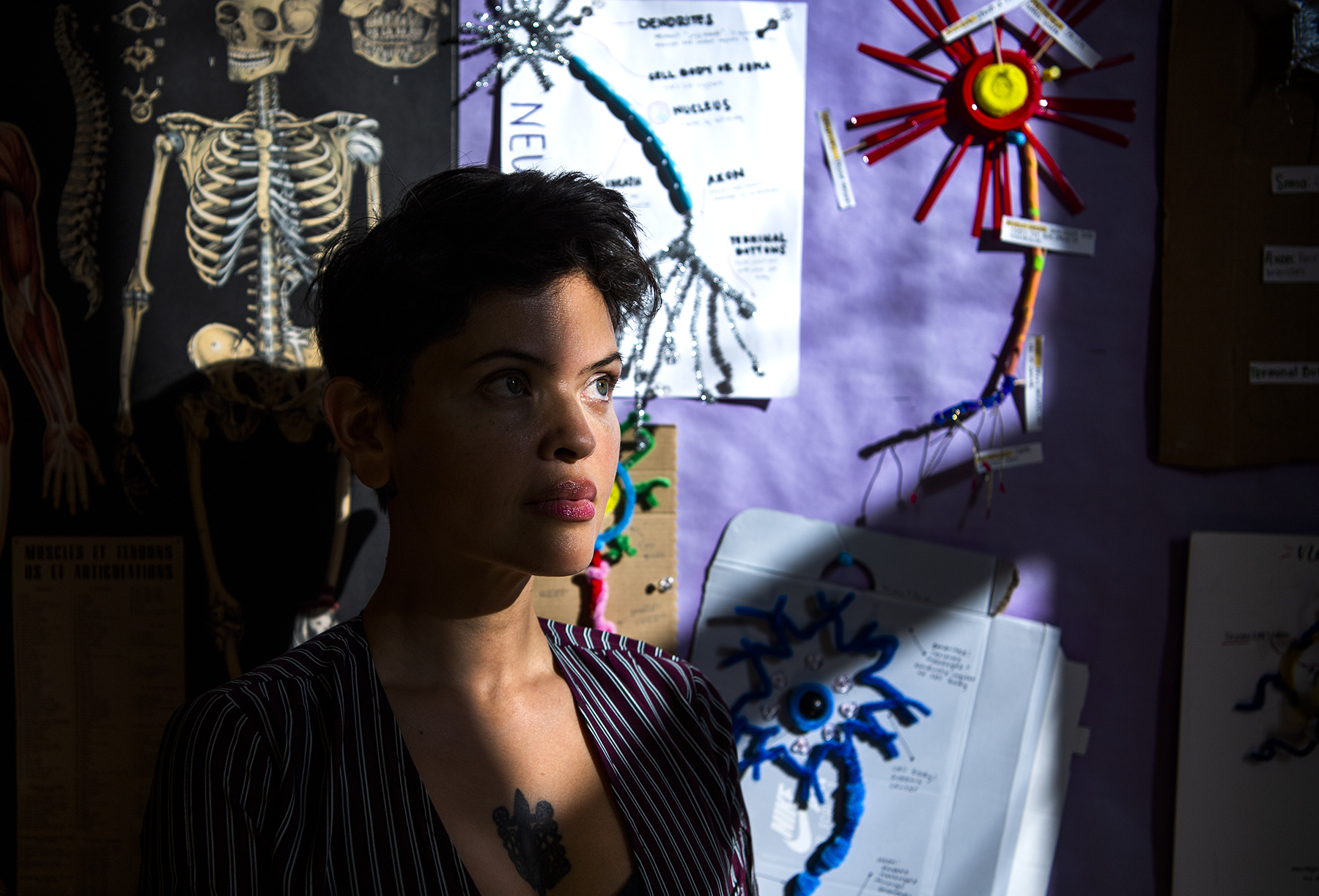Myriam Gurba was teaching class at Long Beach Poly earlier this month when her cellphone suddenly rang. She told her AP psychology students that a reporter from the New York Times had called to speak with her.
“Tell them you don’t want a subscription!”
Gurba laughed before giving the reporter a mouthful about the brewing controversy over “American Dirt,” a much ballyhooed novel about undocumented Mexican immigrants by author Jeanine Cummins, who isn’t Mexican and whose most intimate knowledge of undocumented immigrants comes by way of Ireland.
Gurba, a queer Chicana author and artist who lives and teaches in Long Beach, became the literary luchadora at the center of the “American Dirt” backlash, thanks to a scathing December review she penned in Tropics of Meta, an academic blog. “Pendeja, You Ain’t Steinbeck: My Bronca with Fake Ass Social Justice Literature” exploded online in the lead up to the novel’s January 21 release date, bringing forth a long overdue reckoning over the publishing world’s decision of who gets to tell Latinx stories and how.
“Ultimately, the controversy has far less to do with this little pulguita of a book,” Gurba says over a plate of flautas at Cañadas Grill. “This is about something much bigger. This is about revolutionizing the publishing industry all the way.”
With last year’s mass shooting in Gilroy and the El Paso massacre aimed at brown-skinned people whose mere existence fueled white nationalist, Great Replacement conspiracy theories, Gurba had little patience for posers as she explained with impassioned exuberance.
Cummins’ newest work positioned itself as a literary salve for these fatefully xenophobic times, an effort meant to provoke empathy in the hearts of those who don’t see the human side of immigration. It came equipped with an Oprah Book Club push, complete with celebrity social media boosts from the likes of actresses Salma Hayek and Yalitza Aparicio (Hayek later deleted her Instagram post and issued an apology). Famed Latina authors Sandra Cisneros and Julia Alvarez lent glowing blurbs in support.

But when Gurba took an advanced review copy of “American Dirt” to read while visiting Guadalajara, Mexico, during a week-long Thanksgiving break from teaching, warning signs appeared even before turning the first page. From the book’s barbed wire jacket cover to a letter from Flatiron Books that spoke of “faceless brown masses” to Cummins’ well-publicized, credibility-building undocumented husband being revealed to be Irish, something seemed off.
And then came the actual story. The book follows Lydia Quixano Perez, a middle class bookstore owner in Acapulco who becomes widowed when a cartel shoots up a quinceañera. Her husband, a journalist on the narco beat, dies in the fusillade. Lydia embarks on a trek to the United States with her son, Luca; one fraught with cultural miscues from everything to regional slang to sour cream on street tacos.
“The big irony for me was to be in real Mexico reading about fake ass Mexico,” says Gurba. “It was just this awful, gross dissonance.”
She initially penned a 650-word review for “Ms.” magazine at their invitation. Although the editor praised its merits, the magazine passed on publishing the piece on the grounds that Gurba didn’t have sufficient clout to command such a takedown.
“A Chicana dissenting voice had been suppressed because of my lack of importance,” she says. “If I were to march into the offices of “Ms.” magazine and tell an editor to tell me the name of 20 famous Chicana writers, they would be hard-pressed.”
Gurba published her review first on social media before finding it a new home in Tropics of Meta. She aimed her criticism at stereotypical portrayals and dreadful writing, saying Cummins’ use of italicized Spanish words “litter the prose, yielding the same effect as store-bought taco seasoning.”
Gurba heavily annotated the review copy’s pages, including a paragraph where Cummins employed the refrain “landscape of carnage,” a slightly more eloquent cousin of President Donald Trump’s “shithole countries.”
Cummins, the recipient of a seven-figure advance for “American Dirt” after a lucrative bidding war, found herself opposite an adversary whose truths began bursting from the margins others sought to confine them in.
In no uncertain terms, Cummins declared “I am white,” in a New York Times essay five years ago where she also mentioned having a Puerto Rican grandmother. Perhaps that’s why nobody bothered howling when Cummins penned “The Crooked Branch,” a 2013 novel that bridged Ireland and America through a generational family saga.
But in an interview about “American Dirt” last year, she referred to herself as “Latinx.” Cummins also professed in an author’s note that she wished someone “slightly browner” than her could’ve written “American Dirt.”
It’s the latest twist in America’s longstanding and tortured gaze towards Mexico in popular culture. Portrayals of Mexicans remain of raging debate long after “greaser” films dripped with stereotypes or Marlon Brando played Mexican revolutionary Emiliano Zapata on screen.
Gurba’s critical review of Cummins’ book, which has been optioned for film adaptation, picked up initial traction, prompting hopes that her rebellion born in Long Beach could shift the national narrative. She followed by tweeting photos of an “American Dirt” publishing party complete with barbed wire centerpieces. Cummins also had tweeted a cover art manicure a fan had gotten featuring barbed wire, the bizarre scene seemingly lifted from a Latinx version of “Get Out.”

Reporters called Gurba for comment, including the aforementioned New York Times, but Gurba felt thrust back to the margins when the Times piece published, especially after the reporter who called during class asked her to summarize her thoughts sans Spanish and cussing.
Dismissed in column space, Gurba counts an otherwise outpouring of solidarity from all quarters on social media, particularly Twitter where her account has swelled by thousands of followers in the last week alone. Sales for Gurba’s acclaimed 2017 memoir “Mean” have also flown off the digital shelves.
“It’s been bonkers!” she says. “I keep imagining my grandfather is incredibly pleased because he was a publicist in Mexico.”
In the backdrop of the restaurant’s flatscreen television showing a soccer game between Pumas UNAM and C.F. Monterrey, Gurba brought up a photo of another ancestor on her phone. She proudly showed a black-and-white portrait of her great-great-grandfather, a Villista during the Mexican Revolution of 1910.
A working writer, Gurba’s leading her own charge all the while teaching and grading. It may be an amped-up experience but not an entirely new balancing act since she moved to Long Beach in the early 2000s. Gurba graduated from UC Berkeley but knew she couldn’t pursue a writer’s life while keeping up with increasing rents. She didn’t want to return to Santa Maria, her lush green hometown infamous for xenophobic politics, either.
“Our mayor came up with the notion of concentration camps for Mexicans when I was a kid,” she says of the late George Hobbs who once declared Santa Maria had a “Mexican problem.”
Long Beach appealed to her, plus she had a sister attending Cal State Long Beach at the time. “I needed a change of pace and scenery.” After settling in, Gurba established ties to the city’s Arts Council and exhibited her “MEriam,” digital collage artwork at the Museum of Latin American Art in 2016. Since 2007, she’s published “Dahlia Season: Stories and a Novella,” “Painting their Portraits in Winter: Stories,” and “Mean.” Gurba is currently working on a memoir that delves into violence and racism. She also wants to reimagine “Little Women as Chingóncitas!”

But, for now, holding a principled line on “American Dirt” preoccupies her time. In the wake of the controversy, Cummins’ scheduled book appearances in La Jolla and Pasadena have been canceled this week amid protest chatter; the publisher decided to cancel the remainder of the national book tour citing “peril” and “specific threats.” Gurba, herself on the receiving end of racist threats in response to her outspokenness, had planned on attending Cummins’ signing at Vromans.
“The faceless brown masses do have faces,” she says. “Moreover, Cummins ought to hear our voices.”
A lot of people are hearing Cummins’ voice, “American Dirt” was the No. 1 fiction book on Amazon this week. In its English version, the book has received an average score of four out of five stars; the Spanish version, Tierra Americana, is getting two and a half.
Even though the “American Dirt” tour isn’t coming through Long Beach anytime soon, future opportunities to discuss the controversy offline may still arise. Gurba can’t discuss details other than stating Flatiron’s expressed desire to bring folks together.
“There will be a tête-à-tête coming soon,” she said. In the meantime, Gurba continues to stand up against a publishing industry she believes did her people dirty. Unlike in December, the author no longer stands alone.
“I feel vindicated that my concerns and disgust were widely shared,” says Gurba. “We have collective rage.”

